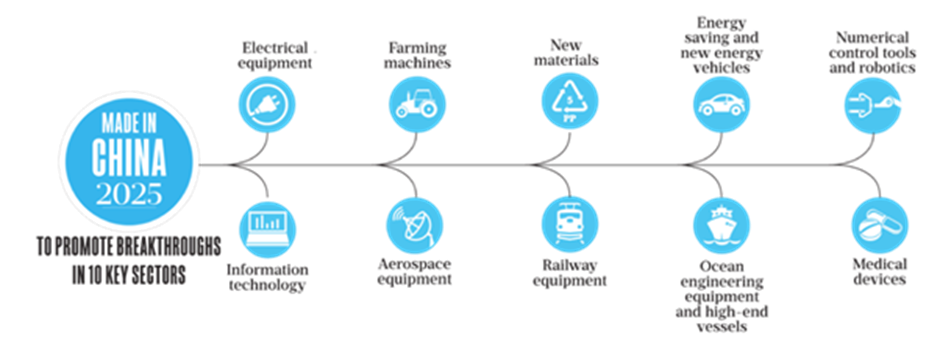By: Sapna Elsa Abraham

A Canada based Tech Insights reported a breakthrough in the Chinese Semiconductor Industry. China based Semiconductor Manufacturing International Corporation (SMIC) is reported to have achieved the feat in advanced semiconductors by the production of 7nm chip or N+2 chip for MinerVA bitcoin mining company.This is considered as a great leap in the production of the advanced chip by a Chinese company. The next generation chip puts SMIC on par with advanced chip makers around the globe.
The 7nm Chips are a crucial component for the most recent consumer products including, AI, Fintech and 5G products. These high-end chips are used to build processors in building 5G base stations. Many 5G electronics companies have claimed to be using 7nm chips for their latest 5G handset, for example MediaTek multi-Mode chipset, this distinguishes other smartphones through System on Chips (SoC).
Moore’s law states that “the number of transistors on a silicon wafer will grow every two years due to the advancement in the technologies used for the manufacturing of chips”.
China has been able to provision for this in terms of the years taken to produce the chip. The factor that is in variance with the law is the technology utilisation.
Due to changing global dynamics and supply chain disruptions, attempts are made by countries, especially the US and China, to localise the industry. Being self-sufficient in all components of the chip manufacturing process is vital. China at present dominates the back-end manufacturing (assembly, test, and packaging). They lack design and manufacturing components.
China is resolved to build an economy which is self-reliant with special emphasis on all core technologies, like semiconductor, quantum computers and AI. Under President Xi Jinping several policy decisions have been focusing on achieving this self-sufficiency. In the speeches in the recently concluded 20th National Party congress, Xi mentions the word, technology at least 55 times.
‘Made in China 2025’, a People’s Republic of China led industrial policy, is aimed at enhancing China’s domestic chip industry. Providing subsidies and incentives China has been speeding up the development of domestic fabrication plants to localise the most vital elements of the technology supply chain. Another step towards this is the formation of ‘China National Integrated Circuit Industry Investment Fund’ targeting exclusively semiconductor chips.
Tech Sight claims that the chip produced by SMIC is very similar to the 7nm chips by TSMC. This has been labelled as ‘Industrial espionage’. The west is worried about the extent to which China would go to ensure their technological independence is achieved.
The semiconductor Industry is a suitable example of a highly globalised world with each specialisation concentrated on one territory. The major Semiconductor players happen to be allies of the USA. Taiwan, South Korea, Netherlands, Japan. This provides the US with an opportunity to consistently deny China the high-end processors and technology.
To produce 7nm chips the Extreme Ultraviolet Lithography (EUV) immersion tool is used by other leading chip makers like Intel, Samsung & TSMC. China reportedly still uses the Deep Ultraviolet Lithography (DUV), used to produce previous generations of semiconductors.
China has been deprived of the latest tool required to take a leap in the chip industry. The EUV monopolised by a Dutch company ASML has been restricted by the US in sharing the technology with China. It would be difficult for SMIC or any Chinese company to be economically competitive without the use of EUV, as the chips are made into perfection with continuous production. Shanghai Micro Electronics Equipment Co. (SMEE) is the leading lithography producer of China. SMEE is an ambitious plan of China to replace ASML. The fact that China has been able to produce the latest chip with the absence of technological support is a sign of worry for the west and an opportunity in disguise to countries like India trying to make a mark in the semiconductor industry.
Advantage for India
To prevent Beijing from achieving a technological edge over Washington the latter has been imposing a range of sanctions against transfer of technologies and advanced semiconductors to China. The US wants to desist China using the American chips to boost their military. The Chip Act 2022 by the United States of America that came into effect on August 9, 2022, is aimed to boost US competitiveness, innovation, and national security and to reinvent itself as a hub for the semiconductor industry. It focuses on limiting Chinese growth to contest this position.
With US legislation clamping down on China, the US would want to find an alternative source for the semiconductor manufacturing at an affordable rate. India with its improving semiconductor ecosystem would be a preferred destination for the American companies.
China has specialised in the assembly, testing, marketing and packaging (ATMP) part of semiconductor production which is a capital- and labour-intensive process. India can be developed as a safe alternative to this process as the looming fear over China denying the supply of these finished chips as a retaliation to US ban is on the high. Especially with the government framing schemes to develop an ecosystem in the country and companies like Tata and Vedanta’ increased interest over the manufacturing of semiconductors will boost the semiconductor industry in India.
India can fill up the production gap brought by the shutdown of semiconductor facilities in Japan, South Korea, USA, and China by setting up its own manufacturing facilities. duction gaps by setting up its own manufacturing facilities.
The US and other major players are looking at diversifying its supply chain especially for semiconductors as it poses serious risks as a handful of companies hold the majority share for semiconductor manufacturing. The trade war between the US and China does not seem to be dwindling in the immediate future. This is the opportunity India can tap into. Many large semiconductor companies have set up their offshore centres which specialise into the design part of chips. More than 20% of the world’s semiconductor designers work out of India. Venturing into chip designing would be a boost for the Indian semiconductor ecosystem. India needs to invest in R&D and train her labour force with skill competence. As suggested by vice president of the Indian Electronics and Semiconductor Association, Sunil G. Acharya, “There is an opportunity for the Indian Industry to explore opportunities to become a materials supplier to the global FABs and ATMPs”. The government must incentivise the production of such components by the MSME sector of India.
According to the statement by the Indian Ministry of Electronics and Information Technology, “Building Indian capabilities in semiconductor manufacturing is an imperative for industrial growth, digital sovereignty, technological leadership, national security, self-reliance and for India’s goals to be a significant player in the global electronics and semiconductor value chains”.
Conclusion
The global race for technological breakthrough is taking new dimensions. With increased geopolitical crises brewing across the world, the pandemic, the trade war and Ukraine war, the world has been witnessing the downside of globalisation. Nations are in a race to localise the manufacturing sector and secure their supply and value chain. In such a time a breakthrough like this by China is being assessed very closely. The question will be how much can China move forward without the technological component from the West? Can China find any alternatives to continue and sustain the feat they achieved? The increasing imposition of US sanctions on China, especially after achieving the 7nm production, is an opportunity for India to develop as a go to destination for Chip industry.

About the Author
Sapna Elsa Abraham is a Research officer at the Chennai Centre for China Studies. She completed her graduation in History, Economics and Political Science from Christ (Deemed to be University) and holds Post Graduation in International Relations from the University of Madras. Her research work focuses on “Indian Naval Diplomacy” and “The Influence of Portuguese rule on Malayalam language”. Her area of interest includes Maritime Security, Environmental Security and Diplomacy including International Organisations. She tweets at @elsa_sapna. The views expressed are personal.


Your point of view caught my eye and was very interesting. Thanks. I have a question for you.
Your point of view caught my eye and was very interesting. Thanks. I have a question for you.
Your point of view caught my eye and was very interesting. Thanks. I have a question for you.
Thank you for your sharing. I am worried that I lack creative ideas. It is your article that makes me full of hope. Thank you. But, I have a question, can you help me?
Thank you for your sharing. I am worried that I lack creative ideas. It is your article that makes me full of hope. Thank you. But, I have a question, can you help me?
Thanks for sharing. I read many of your blog posts, cool, your blog is very good.
Thanks for sharing. I read many of your blog posts, cool, your blog is very good.
Thank you for your sharing. I am worried that I lack creative ideas. It is your article that makes me full of hope. Thank you. But, I have a question, can you help me?
Thanks for sharing. I read many of your blog posts, cool, your blog is very good.
Thanks for sharing. I read many of your blog posts, cool, your blog is very good.
Thanks for sharing. I read many of your blog posts, cool, your blog is very good.
Thanks for sharing. I read many of your blog posts, cool, your blog is very good.
Your article helped me a lot, is there any more related content? Thanks!
Your point of view caught my eye and was very interesting. Thanks. I have a question for you.
Your article helped me a lot, is there any more related content? Thanks!
Thank you for your sharing. I am worried that I lack creative ideas. It is your article that makes me full of hope. Thank you. But, I have a question, can you help me?
Can you be more specific about the content of your article? After reading it, I still have some doubts. Hope you can help me.
Thank you for your sharing. I am worried that I lack creative ideas. It is your article that makes me full of hope. Thank you. But, I have a question, can you help me?
Your point of view caught my eye and was very interesting. Thanks. I have a question for you.
Thanks for sharing. I read many of your blog posts, cool, your blog is very good.
Your point of view caught my eye and was very interesting. Thanks. I have a question for you.
Thank you for your sharing. I am worried that I lack creative ideas. It is your article that makes me full of hope. Thank you. But, I have a question, can you help me?
Your point of view caught my eye and was very interesting. Thanks. I have a question for you. https://accounts.binance.info/en-IN/register-person?ref=UM6SMJM3
Thanks for sharing. I read many of your blog posts, cool, your blog is very good.
Your article helped me a lot, is there any more related content? Thanks!
Thanks for sharing. I read many of your blog posts, cool, your blog is very good. https://accounts.binance.com/kz/register-person?ref=K8NFKJBQ